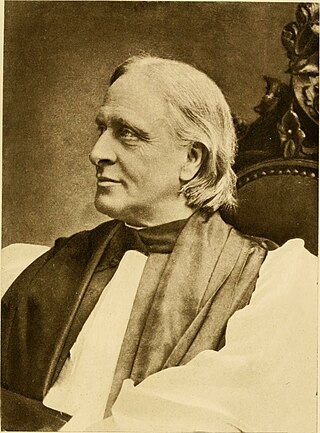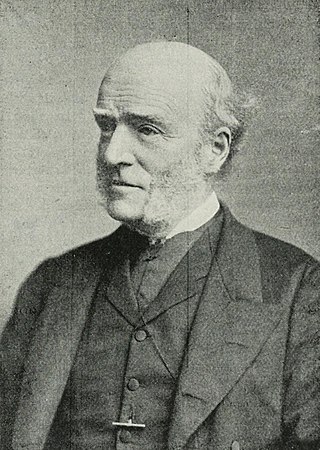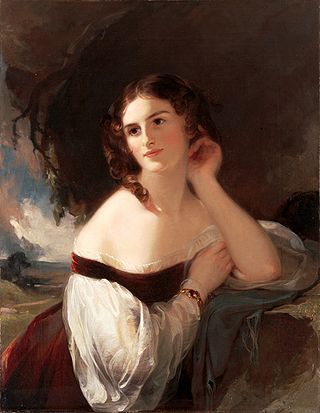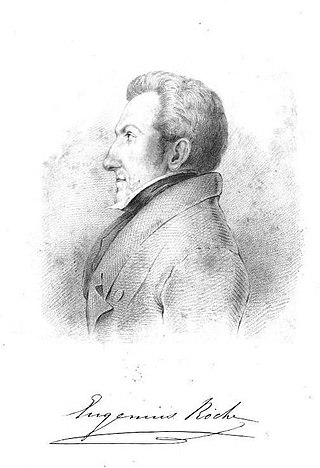
Charles John Huffam Dickens was an English novelist, journalist, short story writer and social critic. He created some of literature's best-known fictional characters, and is regarded by many as the greatest novelist of the Victorian era. His works enjoyed unprecedented popularity during his lifetime and, by the 20th century, critics and scholars had recognised him as a literary genius. His novels and short stories are widely read today.

Matthew the Apostle is named in the New Testament as one of the twelve apostles of Jesus. According to Christian traditions, he was also one of the four Evangelists as author of the Gospel of Matthew, and thus is also known as Matthew the Evangelist.

Edward White Benson was archbishop of Canterbury from 1883 until his death. Before this, he was the first Bishop of Truro, serving from 1877 to 1883, and began construction of Truro Cathedral.

Joseph Barber Lightfoot, known as J. B. Lightfoot, was an English theologian and Bishop of Durham.
This article contains information about the literary events and publications of 1790.

Thomas Hughes was an English lawyer, judge, politician and author. He is most famous for his novel Tom Brown's School Days (1857), a semi-autobiographical work set at Rugby School, which Hughes had attended. It had a lesser-known sequel, Tom Brown at Oxford (1861).

Frances Anne Kemble was a British actress from a theatre family in the early and mid-19th century. She was a well-known and popular writer and abolitionist whose published works included plays, poetry, eleven volumes of memoirs, travel writing, and works about the theatre.

Francis Place was an English social reformer described as "a ubiquitous figure in the machinery of radical London."

Francis William Newman was an English classical scholar and moral philosopher, prolific miscellaneous writer and activist for vegetarianism and other causes.

Frances Browne was an Irish poet and novelist, best remembered for her collection of short stories for children, Granny's Wonderful Chair.

The British Critic: A New Review was a quarterly publication, established in 1793 as a conservative and high-church review journal riding the tide of British reaction against the French Revolution. The headquarters was in London. The journal ended publication in 1843.

Thomas Rawson Birks was an English theologian and controversialist, who figured in the debate to try to resolve theology and science. He rose to be Knightbridge Professor of Moral Philosophy at the University of Cambridge. His discussions led to much controversy: in one book he proposed that stars cannot have planets as this would reduce the importance of Christ's appearance on this planet.

Arminianism was a controversial theological position within the Church of England particularly evident in the second quarter of the 17th century. A key element was the rejection of predestination. The Puritans fought against Arminianism, and King James I of England opposed it before, during, and after the Synod of Dort, 1618–1619, where the English delegates participated in formulating the Calvinist Canons of Dort, but his son Charles I, favoured it, leading to deep political battles. The Methodists, who espoused a variant of the school of thought called Wesleyan–Arminian theology, branched off the Church of England in the 18th century.
Manchester Evening Chronicle was a newspaper established by Sir Edward Hulton, a Manchester City chairman, a newspaper proprietor and a racehorse owner. It started publication in 1897, was renamed Evening Chronicle in 1914 but stayed in Manchester. It continued publication under various ownerships until 1963, when it was merged with the more successful Manchester Evening News and discontinued publication.
Joshua Childrey (1623–1670) was an English churchman and academic, antiquary and astrologer, the archdeacon of Salisbury from 1664. He was a "country virtuoso", and an avowed Baconian. He also has been considered a dilettante.

Eugenius Roche (1786–1829) was an Anglo-French journalist. He is often identified as Irish: his background was certainly Irish, but in the 19th century his own version of his background, that he was born in Paris, was widely accepted.
The Great Writers series was a collection of literary biographies published in London from 1887, by Walter Scott & Co. The founding editor was Eric Sutherland Robertson, followed by Frank T. Marzials.

William Hamilton Reid was a British poet and hack writer. A supporter of radical politics turned loyalist, he is known for his 1800 pamphlet exposé The Rise and Dissolution of the Infidel Societies in this Metropolis. His later views turned again towards radicalism.

This is a bibliography of published works on the history of Wales. It includes published books, journals, and educational and academic history-related websites; it does not include self-published works, blogs or user-edited sites. Works may cover aspects of Welsh history inclusively or exclusively.

Arthur Sidgwick (1840–1920) was an English classical scholar who had an early career as a schoolteacher. Despite his self-deprecating remark "in erudition I am naught", he is considered a great teacher of ancient Greek poetry. He also became an important figure in the advancement of female education at the University of Oxford.















